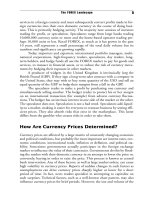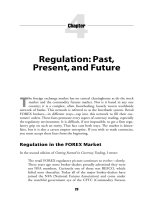Stating a business what you to need know
Bạn đang xem bản rút gọn của tài liệu. Xem và tải ngay bản đầy đủ của tài liệu tại đây (1.79 MB, 218 trang )
This is the stuff you’ve always been embarrassed to ask
about the world of modern business.
The What You Need to Know . . . books can get you up to
speed on a core business subject fast. Whether it’s for a
new job, a new responsibility, or a meeting with someone
you need to impress, these books will give you what you
need to get by as someone who knows what they’re
talking about.
Each book contains:
᭤ What It’s all About – a summary of key points
᭤ Who You Need to Know – the basics about the
key players
᭤ Who Said It – quotes from key figures
᭤ How You Need to Do It – key steps to put your
new-found knowledge into practice
᭤ What You Need to Read – books and online
resources for if you want to deepen your
knowledge
᭤ If You Only Remember One Thing – a one-liner
of the most important information
You might also want to know:
᭤
᭤
᭤
᭤
᭤
᭤
What
What
What
What
What
What
You
You
You
You
You
You
Need
Need
Need
Need
Need
Need
to
to
to
to
to
to
Know
Know
Know
Know
Know
Know
i
about
about
about
about
about
about
Business
Economics
Project Management
Leadership
Strategy
Marketing
This edition first published 2011
© 2011 Kevin Duncan
Registered office
Capstone Publishing Ltd. (A Wiley Company), The Atrium, Southern
Gate, Chichester, West Sussex, PO19 8SQ, United Kingdom
For details of our global editorial offices, for customer services and for
information about how to apply for permission to reuse the copyright
material in this book please see our website at www.wiley.com.
The right of the author to be identified as the author of this work has
been asserted in accordance with the Copyright, Designs and Patents Act
1988.
All rights reserved. No part of this publication may be reproduced,
stored in a retrieval system, or transmitted, in any form or by any means,
electronic, mechanical, photocopying, recording or otherwise, except as
permitted by the UK Copyright, Designs and Patents Act 1988, without
the prior permission of the publisher.
Wiley also publishes its books in a variety of electronic formats. Some
content that appears in print may not be available in electronic books.
Designations used by companies to distinguish their products are often
claimed as trademarks. All brand names and product names used in this
book are trade names, service marks, trademarks or registered trademarks of their respective owners. The publisher is not associated with
any product or vendor mentioned in this book. This publication is
designed to provide accurate and authoritative information in regard
to the subject matter covered. It is sold on the understanding that
the publisher is not engaged in rendering professional services. If
professional advice or other expert assistance is required, the services of
a competent professional should be sought.
Library of Congress Cataloguing-in-Publication Data
9780857082046(paperback), 9780857082053(epub),
9780857082060(emobi), ISBN 9781119979197 (ebk)
A catalogue record for this book is available from the British Library.
Set in 10.5/13.5 pt New Baskerville by Toppan Best-set Premedia Limited
Printed in Great Britain by TJ International Ltd., Padstow, Cornwall
For Sarah, Rosanna and Shaunagh.
CONTENTS
Introduction
1
1 – The Idea
7
2 – The Business Plan
37
3 – Laws and Systems
63
4 – The Money Bit
81
5 – Sales and Marketing
105
6 – People
135
7 – Growth and Durability
157
8 – Lifestyle Matters
177
Index
205
vii
INTRODUCTION
1
WHAT YOU NEED TO KNOW ABOUT STARTING A BUSINESS
Starting a business can be a daunting prospect, but it
doesn’t have to be as bad as some people make out. In
fact, it’s a hugely exciting time. Big plans can be inspiring, but doing the simple stuff well makes a huge difference. Some people try to overcomplicate matters, and
this often leads to unnecessary delay, and can reduce
confidence in the early days. This book takes a positive
approach. Practical matters are kept straightforward, and
there is plenty of advice on keeping in the right frame
of mind. There is inspiration from people who have been
there before, and plenty of back-up ideas for when things
don’t go quite as planned.
Millions of small businesses launch every year so you are
not alone when it comes to thinking of starting one.
Picking up this book is the first step on an adventurous
and challenging road. From the beginning, the knack is
to investigate the possible approaches for your business
calmly and simply. Too many people flap around with
hundreds of spreadsheets and lose their bearings in the
process. So we’ll take it gently so as to keep you saner in
the crucial start-up phase.
In the early days, it is crucial to scrutinize the original
idea very carefully. Of course, some are dead on arrival,
and others need crafting before they make sense
and can prove their value. Few are brilliant immediately, so you need patience and an open mind. Ideas
are nothing if they cannot be enacted effectively, so
we will be as clear as possible about this from the very
beginning.
2
INTRODUCTION
We will of course be examining the dreaded business
plan. There is a skill to good business planning and
anyone can learn it. Doing something is the first step.
Too many businesses fail to get under way because they
are still in the planning phase and never come out of it.
It’s a great feeling to discover that in fact you may be able
to complete this in a matter of days.
Not surprisingly, there is always some boring stuff to
cover, but when it’s your own business somehow the motivation is that bit easier because you are the one to benefit.
Knowing what you need to run an effective business is
vital, and that means having a good working knowledge
of the law, and appropriate systems to enable you to
report business performance accurately.
The money bit may sound nasty but you can’t run a business without it – it’s actually what business is all about.
So good budding entrepreneurs need to learn how to
confront pricing, cash flow, supplier payment, and many
other financial matters in a cheerful and pragmatic
manner.
Nor can you run a business without some form of sales
and marketing, so you need to let people know who you
are, where you are, and what you do. You need to know
where to find your customers, and how to communicate
with them in a charming and positive way. People who
start businesses often have a gift for this, but if it doesn’t
come naturally, don’t worry, because there are simple
things that anyone can do to promote their business.
3
WHAT YOU NEED TO KNOW ABOUT STARTING A BUSINESS
You will soon discover that starting a business is a highly
personal matter, and as such it is quite hard to take the
emotion out of it. So in fact a lot of what at first appears
to be factual ends up being emotional. The main reasons
for this are that the original idea will be yours, pretty
much all the decisions are yours, and the success of the
venture is yours. So it is almost impossible to divorce the
fortunes of the business from those of the owner, and
that’s you.
So it’s all about you, which may seem rather scary at this
stage, but in fact it turns out to be brilliant, because the
rewards are all yours, and it’s great to see a direct link
between the effort you put in and the satisfaction you
get back.
Each chapter has a number of common elements:
What It’s All About – A quick summary at the start
listing the important points that will be covered.
Who You Need to Know – Influential figures you
need to know about.
Who Said It – Quotes from famous figures to
remind, inspire and amuse you.
What You Need to Read – Suggestions of good
sources for further reading at the end of each
chapter.
If You Only Remember One Thing – A short line
or two summing up the contents of each chapter.
4
INTRODUCTION
Starting a business is all about taking action. Careful
thought and planning is vital of course, but there’s no
substitute for getting on and doing something. That is
very much a theme of the book, and it is intentionally
organized in such a way as to encourage you to get out
there and do it.
5
CHAPTER 1
THE IDEA
WHAT IT’S ALL ABOUT
᭤ What you want to do
᭤ Researching your market thoroughly
᭤ Potential customers
᭤ Whether it will make money
᭤ Plans and execution
7
WHAT YOU NEED TO KNOW ABOUT STARTING A BUSINESS
Starting a business is a matter of choice – no one can be
forced into it. That’s a very interesting thought, because
so many people working in corporations don’t have a
great deal of choice. Suddenly then, you do. What would
you like to do? It’s a simple enough question, and yet can
be extraordinarily hard to answer. It is a truly unique
moment when you can decide something entirely by
yourself. So it is worth taking proper care to get it right.
Copying something else is unlikely to be very fulfilling,
unless of course that is a deliberate business strategy.
More likely, you will have a view on how a product or
service can be made or delivered in a better way, or in a
manner that is specific to you. This needs to be looked
at carefully before diving in. Clear the decks, create some
proper thinking time, take a deep breath, and begin.
IGNORE EVERYONE ELSE, WHAT DO YOU
WANT TO DO?
People start businesses for hundreds of reasons. In the
UK at any given time, about 4.5 million people are at it,
out of a total labour market of about 30 million, so over
one in six people don’t need a corporation to earn a
living.
The range of reasons for starting a business is vast and
includes:
8
THE IDEA
᭤
᭤
᭤
᭤
᭤
᭤
᭤
᭤
᭤
᭤
᭤
᭤
᭤
᭤
᭤
᭤
᭤
᭤
I hated my boss
Couldn’t stand the politics
Frustration with current job
Got fired or made redundant
I am, or I became, unemployable
Convinced there must be a better way
Wanted to be my own boss/have more control
The chance to use my brain for my own
benefit
Run my life as I want
Life changes everything
Wanted to take a risk
Always wanted to
Wanted the challenge
Wanted to create my own dream job
Spotted an opportunity
Had a safety net
Wanted to make a lot of money
A combination of fear and ambition
Work can be a frustrating business, as this list shows, and
self-employment represents an alternative to enduring
someone else’s way of doing things. The original motivation doesn’t matter that much. What matters very much
is the manner in which you set about designing and
enacting the business you wish to start.
The starting point is what you want to do. As far possible,
this should be a pure thought, unencumbered by too
many outside influences. So, your business is less likely
to be a success if you start it for overly negative reasons
9
WHAT YOU NEED TO KNOW ABOUT STARTING A BUSINESS
that don’t truly reflect your character. Bad ways to start
a business include:
᭤
᭤
᭤
᭤
᭤
᭤
Petulantly trying to prove a point
Revenge against a former employee or rival
Just in it for the money
Wanting a short-term fix
Deciding on a whim
Diving into an idea you have not considered
until very recently
In other words, knee-jerk reactions to your current circumstances don’t work very well. It’s okay to be spurred
on by events, but it’s not okay to jump into something
without proper thought. So that means you need to
ignore everyone else and work out what you want to do.
The old advice from a mother to her daughter was to
identify what you enjoy doing and then find someone to
pay you to do it. This should be the basis on which you
decide what type of business you wish to start. Once you
have the essence of this, of course you will solicit opinion
from others to sense check your thinking. But start on
your own, and ask yourself what you really enjoy doing,
and how you can make a living from that.
If this doesn’t come naturally, try looking to your hobbies
and passions, considering how they can be turned into a
viable business idea, and defining who would pay for
your knowledge or skill in that area. If you can generate
an idea from this simple central thought, it will stand you
in great stead later on. There are many reasons for this,
10
THE IDEA
but the most important are that it is easier to be a success
when you enjoy what you do and it is less arduous working
through tricky times when you instinctively like the
subject matter that earns you a living.
WHAT PRECISELY IS THE IDEA?
The original idea needs very careful scrutiny. Few are
brilliant immediately. Ideas are nothing if they cannot be
enacted effectively, so clarity of thought at the outset is
absolutely vital. As Einstein once said, if you can’t explain
something to your grandmother, then you probably
don’t understand it properly yourself.
Something may be clear in your head, but what happens
thereafter? Like Chinese whispers, everything can
become distorted. The journey from your head to the
wider world is a strange one. You need to have a vision
of what your business could be, work out what you want
to do, and find a way of explaining it clearly. Imagine you
are going public and consider how you intend to let
everyone else know. Your idea needs to follow this
sequence:
᭤
᭤
᭤
᭤
In your head
Rough draft on paper
Refined computer copy
Explanation to someone who knows nothing
about it
11
WHAT YOU NEED TO KNOW ABOUT STARTING A BUSINESS
᭤ Explanation to someone who knows something
about it
᭤ Refinement of the idea
᭤ Acceptance or rejection of the idea
Pitching on a postcard is a good idea. If you can’t explain
in one sentence what the business will do (the ‘elevator
pitch’), then it’s probably too complicated. Keep it
simple. Don’t let business speak affect your clear statement of the proposition. Some businesses are easy to
describe, others not. If it’s a well-known concept, then
you may simply be saying ‘It’s a coffee shop’. No further
explanation is needed, but it doesn’t prove that it will be
a success until we examine other factors, which we’ll do
in a minute.
WHO SAID IT
“The only way to avoid making mistakes is to
have no new ideas.”
– Albert Einstein
12
THE IDEA
If the business idea is not simple, then you still need to
find the simplest language to describe it. Saying you work
in IT solutions doesn’t really explain anything. Don’t get
bogged down in the detail at this stage. ‘It’s an internet
business that provides people with X’ is fine for the
moment. If you are having trouble, try explaining the
customer benefit. This is the benefit that your customers
derive from what you offer. It may well not be the same
as what you do. How you deliver the product or service
is rarely as interesting as the problem it solves. For
example, in the case of a brand of biscuits, the manufacturer may claim they are ‘lovingly hand-crafted from the
finest ingredients’, but the customer benefit is simply
that they taste great.
If this simple expression of the idea meets with general
acceptance, from you when you have lived with it for
a while and from people you respect, then you should
be able to move on. Importantly, though, if there are
significant doubts then you may need to scrap it.
There’s nothing more boring than a person who
insists on clinging onto a lame duck idea when it patently isn’t going to work. Bear in mind that most successful businesses have rejected many prototypes and
initial thoughts. It’s a crucial editing skill that you
need to adopt when starting a business. So, be precise
about the idea, ditch all the bad ones, and refine the
expression of it so that it is short, clear, and intelligible for anyone.
13
WHAT YOU NEED TO KNOW ABOUT STARTING A BUSINESS
WHO YOU NEED TO KNOW
Seth Godin
Seth Godin is one of the world’s most prolific
writers and bloggers – something of a web legend
with a cult following. His main talent as a writer
is to impart technical zeal without the baggage of
geek jargon. He holds an MBA from Stanford
University and has been called the Ultimate
Entrepreneur for the Information Age by Business
Week magazine.
As a well-respected speaker, marketing guru and
agent of change, he has stacks of advice for
businesses large and small. In his book Purple Cow
he encourages businesses to offer something that
is remarkably different from any other product
– do the opposite of everyone else and you will be
more distinctive.
He wants ordinary people like us to start a
movement. Stop ‘sheepwalking’ your way through
work and start doing fresh and exciting work, he
says. We can all create a remarkable future by
running ingenious businesses. With the advent of
14
THE IDEA
the internet, practically anyone can do it.
You just need faith, a good idea, and plenty of
energy to enact it.
His general theme is all about personal
empowerment, which is spot on for those starting
a business. In his book Linchpin, for example, he
explains that you may well be indispensable, and
shows how to drive your career and create a
remarkable future. With more than ten short, very
readable books out, and a significant blog, it’s easy
to soak up some of his inspiration.
WHAT EXACTLY WILL YOUR
BUSINESS BE?
This looks like the same question as ‘What precisely is
the idea?’, but it isn’t. We now move on to describing
what the business will do in order to fulfill the idea. You
need to define a number of important parameters to
15









